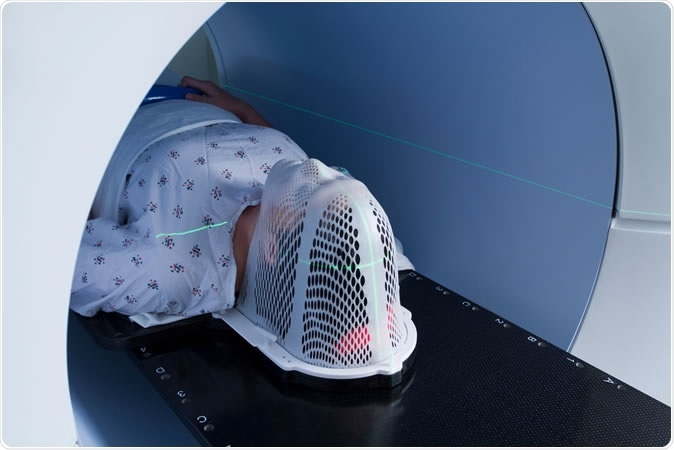A new Phase I study is in the pipeline that would try the effects of low dose radiation therapy for patients with Alzheimer’s disease. The researchers from the Beaumont Research Institute in Royal Oak, Michigan are in the process of recruiting patients for their study. The study is titled, “Study of Low Dose Whole Brain Irradiation in the Treatment of Alzheimer's disease”.

Radiation Therapy. Image Credit: Mark_Kostich / Shutterstock
Alzheimer’s disease affects 6 million older Americans and it is estimated to rise to 14 million by 2050 say the researchers. Despite affecting so many older adults, there is no known cure for the condition which is progressive in nature. It costs the nation $290 billion this year and by 2050 the disease would incur costs of over $1 trillion say experts. The disease affects not only the sufferer but also cripples the care givers and proves to be an important public health problem. At present the drugs available for treatment only provide symptomatic relief and delay progression of the disease without actually curing it. Development of a cheap and easy to administer treatment modality for Alzheimer’s disease would be breakthrough say experts.
They have tried the effects of these low dose radiations on animal models of Alzheimer’s with success and now are moving on to humans. The team explains that their aim is to use “image guided radiation therapy”. This would mean that the radiation would be target specific and imaging studies would determine the areas of the brains that would be bombarded with the radiation therapy. Alzheimer’s disease typically shows deposition of abnormal proteins in the brain called beta-amyloid. These protein clumps affect important areas of the brain and this can lead to impairment of cognitive functions seen in patients with the disease. The deposits of the beta amyloid protein called plaques can be reduced with the help of radiation therapy say the researchers.
The team has been working on this study in several animal models for the past seven years. Finally they have received the nod from the Food and Drug Administration (FDA) to undertake clinical trials that would help test their theory on human patients in clinical trials. Their trial called the Beaumont study has been registered with the number ClinicalTrials.gov NCT#02359864 and is recruiting patients at two study sites. These are the Beaumont Hospital, Farmington Hills where the principal investigator is Dr. James Fontanesi; and the second site is the Beaumont Hospital, Royal Oak where the principal investigator is Dr. Prakash Chinnaiyan.
For the study patients with moderate stage Alzheimer’s disease can enrol in the study and they would undergo whole-brain radiation therapy if they agree to participate in the study. The plan is that the patients would be given five days of radiation therapy for 15 minutes or less time per day. At the start and end of the study their cognitive functioning would be tested and quality of life would be checked using various scales. Before the radiation therapy and at the end of the study, they would undergo PET scans of their brains and the extent of the amyloid deposits would be examined. These PET scans would be repeated after four, six and twelve months after the radiation therapy to see the long term effects of the treatment. All possible toxicities of the radiation therapy would also be recorded for the patients.
For the study initially 15 patients would be enrolled and these patients would be followed up for a period of 12 months after completion of the radiation therapy. They would be provided with radiation therapy of “5 daily fractions of 2 Gy” strength. This would take place at the Botsford Radiation Oncology Center and William Beaumont Hospital (Royal Oak Campus). Once all 15 patients receive the therapy, recruitment of another 15 would start at the other centre. This group of patients at both Botsford Hospital Radiation Oncology Center and William Beaumont Hospital (Royal Oak Campus) would receive radiation to the amount of “10 daily fractions of 2 Gy”. All the 30 patients would be followed up for a period of 12 months after the radiation therapy.
George Wilson, radiobiologist and one of the researchers explained, “Currently there is no cure for Alzheimer’s, and current pharmaceuticals have had limited success. Pharmaceuticals are costly and time consuming to develop. In contrast, radiation therapy is a proven treatment for cancer and can be done safely, quickly and inexpensively.” Animal studies have revealed that this image guided radiation therapy could help reduce the beta amyloid deposits and also stop the progression of Alzheimer’s disease by preventing further cognitive decline of the lab animal models.
Journal reference:
Study of Low Dose Whole Brain Irradiation in the Treatment of Alzheimer's Disease, ClinicalTrials.gov Identifier: NCT02359864, https://clinicaltrials.gov/ct2/show/study/NCT02359864